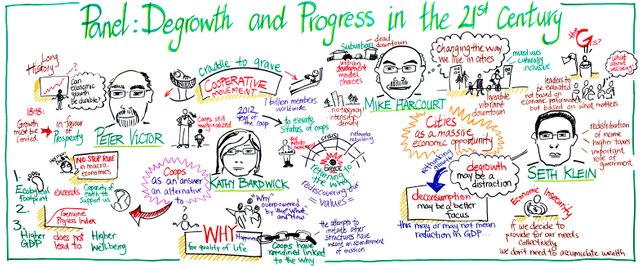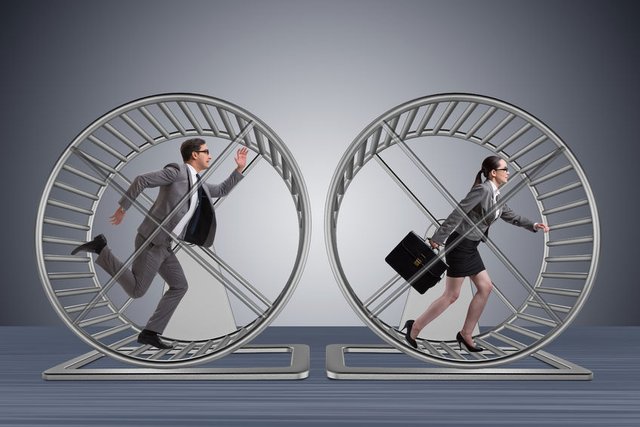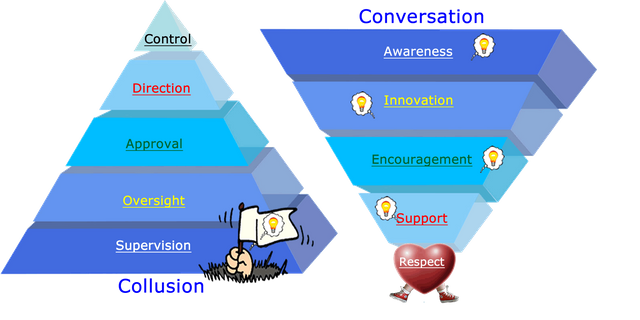Economic "Degrowth" Is The New Paradigm!

This Harvard column does not say it all, yet gives an excellent glimpse at the upcoming system change that is going to rock the planet. Let's think wisely and support Degrowth as a bridge toward a Resource Based Economy!
Why “De-growth” Shouldn’t Scare Businesses | February 14, 2020
HARVARD: The concept of degrowth dates back to the 1970s, when a group of French intellectuals led by the philosopher Andre Gorz proposed a simple idea: In response to mounting environmental and social problems, they suggested that the only real solution was to produce and consume less — to shrink our economies to cope with the carrying capacity of our planet.
EARTH CUSTODIANS: Interestingly the concept of "Degrowth" was already out there that long ago and if it only begins to make the headlines more blatantly, it is because the infinite growth paradigm is losing its credibility finally. This delay evidences the fundamental problem with any given market forces, that we cannot trust the latter since they prevent new trends from gaining more appeal in a timely fashion.
We assume that the Degrowth Theory must have taken shape right after the Club of Rome penned its dire assessment predicting that overproduction had become an unstoppable freight train (see below "Our Ecosystem Breakdown Was Predicted 50 Years Ago!").
The proposal was considered by many at the time to be too radical. But with today’s climate crisis, debates around degrowth have been reinvigorated, and many major figures such as Noam Chomsky, Yanis Varoufakis and Anthony Giddens have, to varying degrees, expressed support for the idea.
As a matter of fact, society is suffering from what we call "the expert syndrome". If not enough experts support a theory, that theory is perceived as too radical or even utopian. It is time to confront this doomed philosophy. Since the beginning of time, we have created various systems empowering hierarchies, with their set of celebrated lawmakers deciding when time is right to shift gear, but meanwhile, the damage is done because the threat has either grown unchecked or was discredited by the same experts.
The point here is that our social structure has not changed over the millennia -- and it is getting time to do something about it. Do you agree?
Experts seem to follow the same pattern which demands them to change their views when their status is seriously challenged. The "same pattern" because we all tend to react when the external pressure is too great, and this is a philosophical matter above all which can be resolved if education could teach kids that fear too often makes us do things highly detrimental to our well being, and that external threats generally mirror facts that we discard or are completely ignorant about.
For others though — especially business leaders — degrowth is completely unthinkable, not least because of the anti-capitalist and anti-consumerist roots of the term. The prevailing view is that growth is an economic necessity, and any threat to that not only undermines business, but basic societal functioning.
In other words, our society is built on the nonsensical premise. If it is what is called “basic societal functioning”, then we’re indeed caught in a never-ending rat race, and it should come to no surprise as to why suicide and depression are world epidemics.

The economist Tim Jackson provides a concise assessment: “Questioning growth is deemed to be the act of lunatics, idealists and revolutionaries..... Others argue that the philosophy of degrowth does not seriously account for technological innovation — specifically the idea that we can continue current growth patterns if we innovate products that are less resource-intensive and generate fewer waste by-products.
Lunatics and revolutionaries?
That very assessment is fast crumbling down as we're faced with an "insect die-off" and beginning to understand why humanity's fate inherently depends on insects today. If the bottom of the food chain goes, all life all goes.
Being pro-life calls into question the profit-seeking mantra, which we have exposed so many times already (see below: Fates of humans and insects intertwined, warn scientists).
First, given the finite nature of our planet, infinite economic growth — even of a different variety — is a logical impossibility. Secondly, innovation and improvements produce, in many cases, unintended consequences. One of which is the Jevons paradox, where individuals compensate for efficiency through increased consumption. For instance, more energy-efficient refrigerators lead to more refrigerators in a home.
Let's not forget the power of advertising here and which is the drive behind unfettered consumerism. Every problem that is seemingly circumvented at the production level will rather be used to make people want more of the same products!
"Seemingly" because the problems never go away when thinking that more profits pouring into the system are going to address any capitalist market flaws.
The third and most fundamental issue is that the degrowth movement has already begun: at a grassroots level, consumer demand is actively being transformed, despite political and corporate reticence. A recent YouGov poll in France highlights that 27% of respondents are seeking to consume less — double the percentage from two years prior. We are witnessing the emergence of consumer-driven degrowth.
Indeed, that is what we have decided to promote and will continue to do so. If we show Wallstreet that we are in control and aware, the market forces will just have to cave in. We have to invert the pyramid of power for a decentralized and holistic system to rise up.
This time, we ought to do things very differently though, and educate ourselves continually so that we can develop critical thinking and establish self-governance as a world model regulated by cooperation and benevolence.

First, firms can pursue degrowth-adapted product design, involving the creation of products that have longer lifespans, are modular, or are locally produced... Firms that incorporate stakeholder engagement in their operations are thereby faster to adapt to degrowth when it becomes more mainstream.
Although the Harvard article mentions a few firms ahead of the curve, most of them will not be able to restructure in a timely fashion because of the expansion of 3D printing for example, which means that it is already possible to design our own products and more importantly without waste. Eventually, even real estate construction will resort to it and many will go bankrupt. Harvard also cites Fairphone, a company that produces repairable phones that dramatically extend their longevity, which is great but calls for the end of the competition model and this will translate into the death of several NASDAQ giants. Fairphone may do better because its business model is built on recycling and repair from the start.
Another obstacle is that endless growth has created unbearable administrative costs throughout the system and with automation around the corner, many positions will soon appear obsolete. Then we also have to take into account disasters such as cobalt (and rare earth minerals) mining fueling the current renewables economic boom, and if addressed that would end the latter overnight. The complexities are multiple but not insurmountable if individualism is replaced with cooperation. That's the ultimate bottom line.
As we continue to grapple with climate change, we can expect consumers, rather than politicians, to increasingly drive degrowth by changing their consumption patterns. Businesses that successfully do so will emerge more resilient and adaptable — instead of necessarily selling more, they will sell better, and grow in a way that satisfies consumers while respecting the environment.
On a final note, we have to stress that the sooner a consumer-degrowth is taking off the better for the planet. Consuming less is essential to regenerate the ecosystem. Indeed we must remain in charge of our destinies because if we don't, corporations will find a myriad of ways to impose their own centralized version of Degrowth and which is completely Dystopian as explained in our Degrowth video series.
FULL HARVARD ARTICLE
https://hbr.org/2020/02/why-de-growth-shouldnt-scare-businesses
FURTHER READINGS
Our Ecosystem Breakdown Was Predicted 50 Years Ago!
https://earthcustodians.net/blog/2019/12/24/the-petrifying-club-of-rome-study-you-never-heard-of-most-likely/
Fates of humans and insects intertwined, warn scientists
https://www.theguardian.com/environment/2020/feb/20/fates-humans-insects-intertwined-scientists-population-collapse
FEB 2020 | The new burger chef makes $3 an hour and never goes home. (It’s a robot)
https://www.latimes.com/business/technology/story/2020-02-27/flippy-fast-food-restaurant-robot-arm
More than a third of U.S. healthcare costs go to bureaucracy | Jan 2020
https://www.reuters.com/article/us-health-costs-administration/more-than-a-third-of-us-healthcare-costs-go-to-bureaucracy-idUSKBN1Z5261
Researchers Warn Massive Insect Die-off Is Harbinger Of “Ecological Armageddon” (2017)
https://www.mintpressnews.com/researchers-warn-massive-insect-die-off-is-harbinger-of-ecological-armageddon/233571/
Earth Custodians' Degrowth Video Series
How To DIRECTLY Participate In The End Of Ecomomic Destruction
https://earthcustodians.net/blog/2019/12/01/how-to-directly-participate-in-the-end-of-ecomomic-destruction/
Forced degrowth is tyrannical. But when you say degrowth, if you're describing increasing decentralization, individualism, choices, decisions, conservatism, efficiency, and effectiveness, then yes. People can choose to use less, to waste less, etc.
decentralization, individualism, choices, decisions, conservatism, efficiency, and effectiveness..... right but I would just replace individualism with cooperation because it is obvious today that all life is connected.
I like cooperation to the extent it is not mandatory.
"Degrowth" isn't gonna help anyone anywhere. You will still be running on the same treadmill. You will just get less for your time on the treadmill.
Getting rid of money is the single most stupid idea I have ever heard.
meanwhile, you make a living because your clients are trained to live on credit

Meanwhile, you don't make a living posting nonsense.
make a living.... hahahaha... pennies per article... watch the world go down then we talk again. You live in fear to see your values turning into ashes because you cannot get that cooperation is more valuable than money, so you troll me. Understandable.
We see how the free market values your dumb opinion.
Capitalism cannot function without cooperation, so it is kind of important to capitalism. Capitalism is built on voluntary cooperation.
I like trolling dumb people who refuse to see reason.